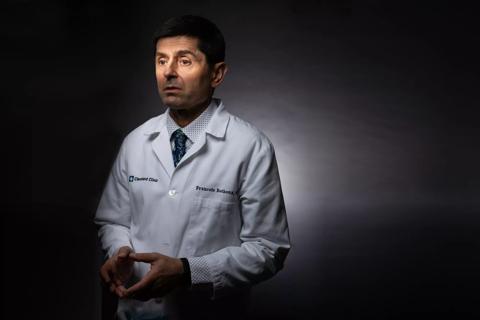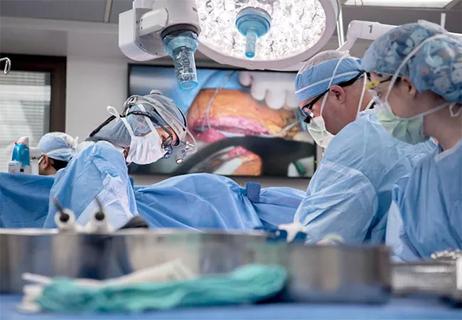A look at the wide-range of services provided by periodontists
Podcast content: This podcast is available to listen to online.
Listen to podcast online (https://www.buzzsprout.com/2241209/14906742)
There are strong links between oral health and systemic health and patients with periodontal disease are at an increased risk for several other conditions.
Advertisement
Cleveland Clinic is a non-profit academic medical center. Advertising on our site helps support our mission. We do not endorse non-Cleveland Clinic products or services. Policy
“I think many doctors can just have a patient open their mouth and what they see is often reflective of what's going on in a patient's whole body,” explains Sasha Ross, DMD, a periodontist at Cleveland Clinic. “There is a very strong link with periodontal disease and diabetes, cardiovascular disease, Alzheimer's disease, rheumatoid arthritis, low birth weight, babies, the list sort of goes on and on.”
In a recent episode of Cleveland Clinic’s Head and Neck Innovations podcast, Dr. Ross shares insight on periodontal disease, treatments and the role of periodontists, including:
Click the podcast player above to listen to the episode now, or read on for a short edited excerpt. Check out more Head and Neck Innovations episodes at clevelandclinic.org/podcasts/head-and-neck-innovations or wherever you get your podcasts.
Podcast host Paul Bryson, MD, MBA: In otolaryngology, we have a number of subspecialties within dental medicine. There are a number of subspecialties, and I think sometimes as a layperson or as a non-trained person in that area, it's sometimes hard to approach. Just describe periodontics — our listeners may be otolaryngologists or other health professionals, but what are some of the foundational things that you can expect in periodontics?
Advertisement
Dr. Ross: Periodontics is centered on the diagnosis and treatment of periodontal disease, which is a bacterial infection in the gum tissue that causes gum inflammation and ultimately leads you to lose bone around your teeth, which is the foundation of your tooth support. Really, sort of a third of what I do is treat periodontal disease, both non-surgically and surgically. We try and save teeth and grow bone around teeth when possible. A third of what I do is treat gum recession so through gum grafting and a lot of very minimally invasive techniques.
Then that last third is doing extractions and dental implants and growing bone in the preparation of dental implants. Implants came out about 30 to 40 years ago, and now, we’re unfortunately starting to see some issues around implants.
Periodontists are the key dental specialists trying to salvage dental implants and get them healthy if they have different issues. I guess finally, I also sort of dabble in treating disorders of the gum tissue, things like lichen planus or mucus membrane pemphigoid and different disorders like that. I do a little bit of gingival biopsies as well.
Dr. Bryson: So, if a patient is referred to you, what can they expect if they see you or another member of your team?
Dr. Ross: When patients come in, obviously I like to hear what brought them in, especially people that maybe haven't been to a dentist in many, many years. Are they in any sort of discomfort? What are their goals for treatment? What's been their past dental experience?
Advertisement
A lot of people have a lot of anxiety around dental appointments, and we talk about that. I go into different medical conditions that they have in medications that they're on, so we spend a lot of time just talking.
Generally speaking, I will require some some X-rays in order to make a diagnosis. So, either patients will bring them in, or we’ll take them. I look in their mouth and do a full exam, and sometimes we take molds of their teeth. Depending on the case, sometimes I ask that they come back at a separate visit to come up with a plan if I need to speak with other dentists or medical providers. But we generally try and provide options for them as far as treatment goes, and we really try to give them a diagnosis.
Advertisement
Advertisement

How chiropractors can reduce unnecessary imaging, lower costs and ease the burden on primary care clinicians

Networking, focused planning may be keys to success

Initiative recognizes excellence, strengthens alumni engagement

Beyond recognizing and treating food allergies, GIs also have a responsibility to address common food allergy misconceptions

In rehabilitation medicine, the answer might require nuance

Cleveland Clinic’s Adult Reconstruction Research leaders share what they’ve learned over 16 years

Program balances new subspecialty certification requirements, offers robust training experience

Analysis of HNSCC patients shows HPV status to be predictive of higher abundance of oncobacteria within the tumor